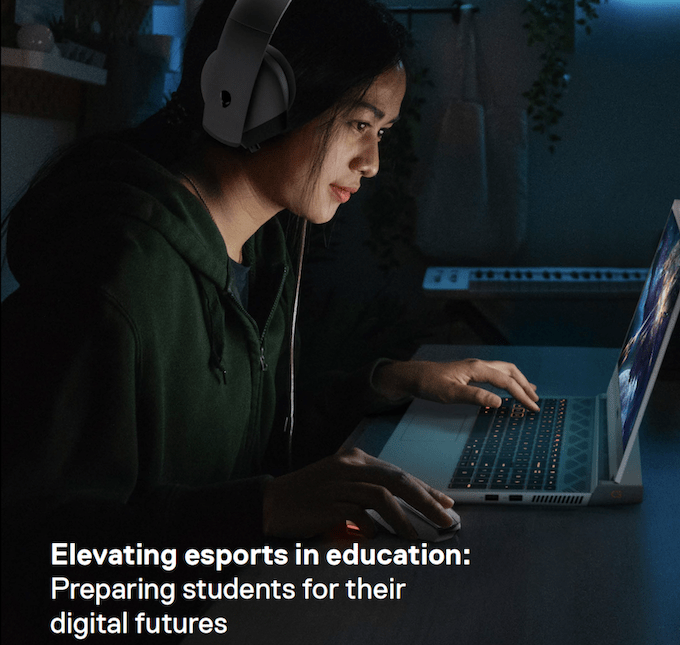Esports in education: preparing students for their digital futures
The stage is set for esports to transform learner outcomes and propel students towards future-facing career paths. But not everyone is aware of the benefits of using esports in education as a tool to engage, inspire and broadly develop student skill sets. So says Dell in their Esports in education: preparing students for their digital futures report. The paper evaluates the perception of esports’ true value in education and the barriers to adoption. This is important as extracurricular esports activities grow in popularity and a fresh push for an esports curriculum ripples across the UK.
The report covers several important areas. Some of the summary findings from each are found below.
The role and impact of esports in education – young gamers have grown up online. Their passion for video gameplay presents an unmissable opportunity for educators to engage students at school and build vital real-world skills. Businesses report digital skills gaps and post-pandemic social inequities soar. Elevating esports as a powerful educational vehicle that touches many vocational and academic subjects is key. But there are barriers.
Understanding the educational value of esports – gaming is incorrectly conflated with esports. While gaming is a leisure activity that connects players worldwide, esports is a competitive, professionalised industry. The mix-up allows the outdated and incorrect stereotype of the lonesome gamer in their bedroom to prevail, damaging the prospects of esports in education.
Nearly four out of five educational stakeholders in the UK say they believe esports should be taught in schools. This is backed up by almost half of UK parents who believe esports should be added to the school/college curriculum — and two-thirds who think it should be offered as an extra-curricular activity in schools and colleges.
Esports in education today – attitudes towards esports in education have progressed. The fundamental support of organisations like the British Esports Association (BEA), which created the world’s first formal esports BTEC qualification, has helped drive this forward.
Improving learner outcomes with esports – UNESCO is a long-term champion of education through gameplay — building it into sustainability goals and elevating it through the Games for Learning project. It highlights the positive impact games can have on education engagement by building meaningful connections. Of the education stakeholders who believe esports should be taught in schools in the UK, over half (52%) said it would help increase grades in other subjects — while more than two-thirds (67%) believe it will teach students soft skills.
Cultivating STEM skills – the positive correlation between video gameplay and Science, Technology, Engineering, and Mathematics (STEM) skills has implications for career pathways and society in general — supporting the closing of gender gaps in STEM careers and helping to plug the skills gap. Lindsey Eckhouse, commercial director at McLaren, says STEM is huge: “It’s such an important piece of our overall education agenda and in racing in general. In esports, particularly in sim racing, it’s a team effort — it’s not individual. It’s all about problem-solving: quickly identifying challenges and ways to overcome them together. There’s a scientific methodology, too. Players must think systematically as they test different hypotheses and see what works. And finally, they’re using data to help inform future strategies”.
Shaping rounded students with soft skills – almost half (48%) of UK parents agree that esports develops certain skills that children may not get through traditional learning. Of those parents, 54% believe it builds confidence, 62% believe it teaches teamwork skills, and 54% think it grows communication skills. All three factors are essential in cultivating well-rounded, resilient students and seizing opportunities in the future workplace. Esports provides a structured way to develop these skills.
Tangible career pathways beckon – over 60% of UK parents believe gaming or esports is a legitimate learning method. However, only 32% say they would be happy for their child to have a career in esports. As the industry booms, it offers very legitimate career pathways for all students, and all parents must be on board to ensure equal opportunity.
Driving inclusivity with esports – parents are optimistic about the inclusivity of esports. Over two-thirds (70%) state that esports promotes inclusivity amongst children at school/college, with half (50%) agreeing that esports allows for more diversity across its player base.
Bridging gender gaps – “I don’t think esports right now does promote gender inclusivity. Games are typically marketed to boys, not girls. So, there in starts that shift, where more boys play versus girls. It’s really important for big rights holders, big entities, big publishers, to really be focused on creating programmes and tools that empower more girls or underrepresented communities to engage in gaming,” says Eckhouse. Part of the solution is creating more female role models, finding more appealing games for girls, and encouraging them into the world of esports at the primary school level.
Increasing the scope for student engagement – Connecting students from a variety of backgrounds, locations, and with diverse physical and cognitive abilities is powerful — as is grouping students according to ability rather than the identifiers typically used in traditional sports, like age or gender. But ultimately, esports in education is about harnessing that passion and enabling students that might otherwise not have the opportunity to shine.
Bringing esports into education also levels the playing field for those from lower socio-economic backgrounds, who may not have had access at home to the level of equipment and software available in schools. It also creates a compelling hook for school attendance, boosting student engagement across the board — particularly among harder-to-reach students.
Elevating the potential for esports in education – Over 40% of educational stakeholders in the UK believe that parents and children do not know enough about esports in education. This suggests that further efforts are needed to grow awareness around the esports in education opportunity to enable full support for students and equity of opportunity. Of those resistant to esports in the curriculum, 61% cited a lack of evidence of its educational benefits.
Bringing teachers on the esports journey – people don’t know enough about what this particular programme is and what this educational curriculum can do for students in terms of their skills development, and their professional development. Strong advocacy is a part of the solution, from school leadership down and from parents to schools.
Putting parents in the picture – half of UK parents who think that esports doesn’t play a positive role in education believe that the content is not relevant or appropriate for education purposes, that it is a distraction from learning methods, and that it will not provide children with real-world experiences. This suggests that more knowledge sharing with parents could be all it takes to see an uptick in support for esports in education.
Expensive equipment stalls esports adoption in schools – equipment poses one of many barriers to school adoption, with 41% of education stakeholders believing that schools/colleges do not have the facilities for esports equipment. Meanwhile, over half (55%) think esports equipment is too expensive and creates a barrier to implementation. Getting the right kit into schools is an important part of the esports-in-education equation and the ultimate barrier to adoption.
Breaking down digital divides – Accessibility poses another barrier to esports in education, with 53% of education stakeholders citing network connections at school/college campuses and home as not strong enough. Meanwhile, of those education stakeholders who believed that esports should not be taught in school (19%), almost half (46%) attributed this to the fact that not every student will have access to esports at home. The pandemic fully exposed this digital divide, as life went online and those without access or devices were isolated. It resulted in lost education for the poorest and most vulnerable students.
Coming together for brighter student futures – There is plenty of work to be done to secure the digitally-driven education students need to prepare them for future careers. While the Dell Technologies report demonstrates an exciting level of awareness and curiosity among educators and parents, misperceptions around what esports really is and its educational value still need to be addressed. Parents and teachers must be fully aware of the value esports can have in education if it is to get the support and investment it needs.
Download the Esports in education report
Click here to read the full Esports in education: preparing students for their digital futures report. You may also be interested in the gaming in 2022 – how do consumers engage report. Click here for more info.
If you’re looking for advice from an esports or gaming agency, Strive Sponsorship can help. Contact us for esports, sports, sponsorship, commercial, content, media, operations, investment, and communications consultancy services.
Frequently asked questions
What are the benefits of esports?
Esports can teach life skills, just as sports can. These could include transferable skills such as decision-making under pressure, communication, leadership, strategy and planning, problem-solving, resilience, and overcoming adversity.
What is the definition of academic esports?
Esports educational qualifications are now offered by a number of universities and higher education facilities. The type of knowledge and skills taught can include topics like enterprise and entrepreneurship, strategy and analysis, events management, video production, shoutcasting, coaching, health and wellbeing, law/legislation and computer networking. Learners will also develop a wide range of transferable skills and knowledge that can be applied to other careers and sectors including digital and STEAM-based careers.
How are games used in education?
Games are used in a variety of different ways in education. From explaining concepts and making content more engaging and relevant to the learner, to supporting problem-solving skills and understanding how incomes impact outcomes.














